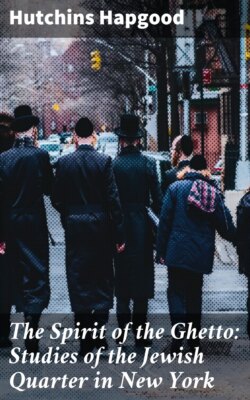Читать книгу The Spirit of the Ghetto: Studies of the Jewish Quarter in New York - Hutchins Hapgood - Страница 7
На сайте Литреса книга снята с продажи.
THE "INTELLECTUALS"
ОглавлениеTable of Contents
Between the old people, with their religion, their traditions, the life pointing to the past, and the boy with his young life eagerly absorbent of the new tendencies, is a third class which may be called the "Intellectuals" of the Ghetto. This is the most picturesque and interesting, altho not the most permanently significant, of all. The members of this class are interesting for what they are rather than for what they have been or for what they may become. They are the anarchists, the socialists, the editors, the writers; some of the scholars, poets, playwrights and actors of the quarter. They are the "enlightened" ones who are at once neither orthodox Jews nor Americans. Coming from Russia, they are reactionary in their political opinions, and in matters of taste and literary ideals are Europeans rather than Americans. When they die they will leave nothing behind them; but while they live they include the most educated, forcible, and talented personalities of the quarter. Most of them are socialists, and, as I pointed out in the last section, socialism is not a permanently nutritive element in the life of the Ghetto, for as yet the Ghetto has not learned to know the conditions necessary to American life, and can not, therefore, effectively react against them.
It is this class which contains, however, the many men of "ideas" who bring about in certain circles a veritable intellectual fermentation; and are therefore most interesting from what might be called a literary point of view, as well as of great importance in the education of the people. Gifted Russian Jews hold forth passionately to crowds of working men; devoted writers exploit in the Yiddish newspapers the principles of their creed and take violent part in the labor agitation of the east side; or produce realistic sketches of the life in the quarter, underlying which can be felt the same kind of revolt which is apparent in the analogous literature of Russia. The intellectual excitement in the air causes many "splits" among the socialists. They gather in hostile camps, run rival organs, each prominent man has his "patriots," or faithful adherents who support him right or wrong. Intense personal abuse and the most violent denunciation of opposing principles are the rule. Mellowness, complacency, geniality, and calmness are qualities practically unknown to the intellectual Russian Jews, who, driven from the old country, now possess the first opportunity to express themselves. On the other hand they are free of the stupid Philistinism of content and are not primarily interested in the dollar. Their poets sing pathetically of the sweat-shops, of universal brotherhood, of the abstract rights of man. Their enthusiastic young men gather every evening in cafés of the quarter and become habitually intoxicated with the excitement of ideas. In their restless and feverish eyes shines the intense idealism of the combined Jew and Russian—the moral earnestness of the Hebrew united with the passionate, rebellious mental activity of the modern Muscovite. In these cafés they meet after the theatre or an evening lecture and talk into the morning hours. The ideal, indeed, is alive within them. The defect of their intellectual ideas is that they are not founded on historical knowledge, or on knowledge of the conditions with which they have to cope. In their excitement and extremeness they resemble the spirit of the French "intellectuals" of 1789 rather than that more conservative feeling which has always directed the development of Anglo-Saxon communities.
